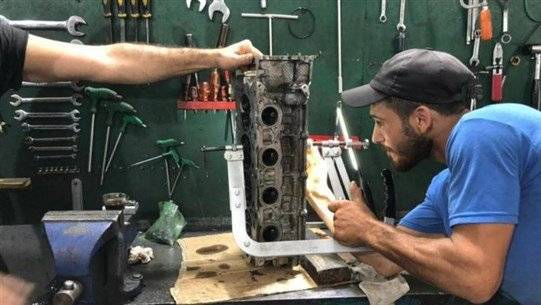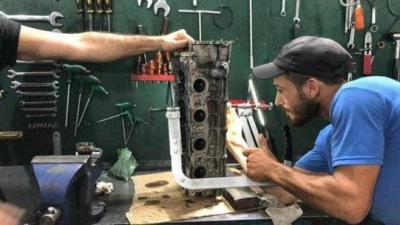"Get the car parts and come," is the advice given by the mechanic in the industrial city of Jisr al-Basha, Zouk, and Wadi Hantouch (Jounieh). But why this advice? What is happening in the garages, and what is the struggle of citizens with car repairs? To fix his car, one customer is trying to gather fifty dollars, the price of a small part in his vehicle, and he has been aware of the malfunction for seven months. If he doesn't fix it, the cost of gasoline will remain high, as this part regulates fuel consumption. Jamal, the name of this customer, has moved between several garages, disconnected the part, and chose the cheapest quality. This is not the only story in the industrial cities; there are dozens like this customer who cannot give up their cars and are affected by the "dollarization" of spare parts, to the point where employees are requesting advances on their salaries to repair their cars.
What is the situation in the garages? Danny, the owner of a garage in the Jesus the King area, admits that business has changed; there is no longer "surplus" through selling car parts or repairs, as a week may pass without any work (meaning repairs). There are even customers who prefer to secure the car parts themselves, and we just reconnect them, believing they will only pay for the labor, negotiating over ten dollars that is equivalent to 300,000 Lebanese Lira. Some customers request old parts that we have disassembled, as he put it, to sell as scrap metal, recouping some of their expenses. Danny has reduced the number of employees to cover his shop's expenses, while Tony (in Jisr al-Basha) has laid off everyone, opting to handle repairs himself to save money, stating that if things continue as they are, he will close his business.
The volume of repairs and customer visits is dependent on the dollar; even workers are sharing news of falling prices for Range Rovers and all kinds of gasoline-consuming vehicles, with prices reaching up to five thousand dollars, a shocking figure relative to their manufacturing year. Everything has changed for Rayan (a worker in a garage in Jisr al-Basha); the pace of work has slowed, and there is no longer "surplus," whether through selling car parts or repairs, as the cheapest part costs thirty dollars, leading customers to respond, "I don’t have it." With the lower volume of work, any car serviced daily means lower wages; those who used to earn 300 dollars now barely make a hundred. Habib recounts how the number of his colleagues in the garage has shrunk; he sleeps in the same shop as his colleague, lacking the financial means to commute daily to Akkar or elsewhere. He even has no luxury to buy a sandwich for 35,000 Lira, sometimes waiting for a dish his mother sends with neighbors who live a lifestyle of sacrifice, meaning those who "live" in garages that close their doors at the end of the workday for fear of car theft.
With the slow pace of work, new graduates gain experience from major automotive companies and then move on to open small "garages," taking customers from those companies at lower prices, with either used or imitation spare parts. This is the only outlet for those studying any field related to car repair, which is taught in institutes rather than universities. Like Eli, who worked at Mercedes and describes himself as a "risk lover," counting on bringing in "new" repair techniques. He shares stories and recounts how there are no longer any original spare parts on the market.
Among all these difficulties, only Farid Hajili (a mechanic) from Sarba has taken to the street as his "garage," enduring despite his advanced age. He rented a garage in Wadi Hantouch a long time ago, which indeed resembles the valley, separated by a tunnel leading to a row of shops for car and motorcycle repairs. Because of his asthma and the hurtful odors there, he moved to repair cars near his home in Sarba. Here, people gather daily to fix their cars. When you ask a customer why, he tells you about this "trust" shared with the elderly mechanic who charges half the labor fee, considering he saves on rent and other expenses. In Wadi Hantouch, there are numerous complaints about Syrians encroaching on the profession, especially in motorcycle repairs. One of the blacksmith shop owners recounts how customers today settle for "putty" because working with metal is more expensive.
How have spare part prices changed? Moving to a shop selling car parts to inquire about prices, Gabi clarifies that imitation parts (a term for anything that isn't European or is counterfeit under original company names) are 80% cheaper than originals, usually made in China, Taiwan, or India, and even those come in different quality ranges from more expensive to cheaper, reducing the profit margin anyway. Gabi imports these parts but predicts that with the increase in customs dollar rates, he will have to "bake with joy," restricting himself to what he imports, only bringing in what the citizen requests without stockpiling. He explains that his business has declined by 70% from previous levels, as insurance companies have cut back on their operations, which were his largest clientele, leaving him reliant only on citizens whose purchasing power is limited, with his cheapest part priced at two dollars, a tire bolt.
In light of this reality, many citizens have shared stories of selling their cars or relying on public transportation, which the state still does not know how to organize, and has not compensated workers with daily transport allowances. So how is the citizen expected to reach his job?




